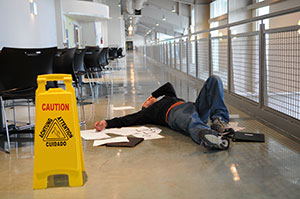December 21st, 2014
 Whether it’s a restaurant kitchen, cafe, hotel spa treatment room, or commercial property, you must consider your staff and your customers when it comes to the choices you make about flooring.
Whether it’s a restaurant kitchen, cafe, hotel spa treatment room, or commercial property, you must consider your staff and your customers when it comes to the choices you make about flooring.
An anti-slip concrete floor treatment can make your floor more slip resistant when wet, without subtracting from the look and aesthetics of the flooring itself. The changes made to concrete by adding an anti-slip treatment are so miniscule that they cannot be seen by the naked eye. Many business owners are unsure about anti-slip treatments as they worry about the effect it might have on the appearance of the floor, when in actual fact the treatments do nothing but make the floors safer for use.
After motor vehicle accidents, injuries caused by slipping or falling over account for the majority of insurance liability payments. Over the last decade, the amount of worker’s compensation insurance claims for slipping and falling over has also dramatically increased.
When someone is injured at your place of business, it’s an unfortunate situation for everyone involved. If it’s a staff member, not only will you have to go through the worker’s compensation claim process, but your staff member may be out of action for a significant amount of time. All of this will cost your business time and money.
Since a reasonably priced solution is available, it makes sense to look after the wellbeing of those around you and minimise risk to your business by investing in an anti-slip floor treatment.
Basically, it is wise to apply an anti-slip treatment on all floors and surfaces that have the potential to become extra slippery when wet.
The best form of anti-slip agent to use will depend on the area being treated, for example whether it is a bathroom or a dance floor.
There are different types of anti-slip agents on the market. Depending on your needs and flooring, you’ll want to consider which option is best for you. Most anti-slip agents don’t take too long to apply, so there is no need to consider problems associated with downtime.
Depending on the volume of foot traffic in the area being treated, the anti-slip treatment should be reapplied approximately every 3-5 years, determined by which type of treatment is used.
Apart from using an anti-slip treatment, regular floor maintenance is paramount to ensuring that flooring in your commercial property is kept non-slip and safe. A regular daily mop is not enough to remove the grease and grime that will accumulate on a floor’s surface, for kitchen areas in particular. It is important to make the effort to ensure proper cleaning methods are put in place to reduce the slipperiness of your floor’s surfaces.
Ultimately, all business owners have a duty of care to their staff and customers to keep their premises as safe as possible. If your flooring is prone to being excessively slippery, applying an anti-slip treatment is a necessary and important investment for your business.